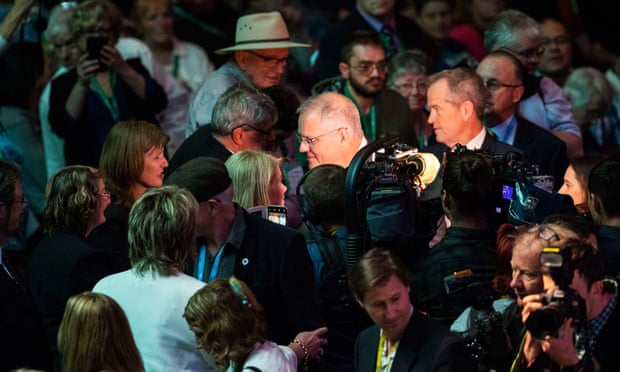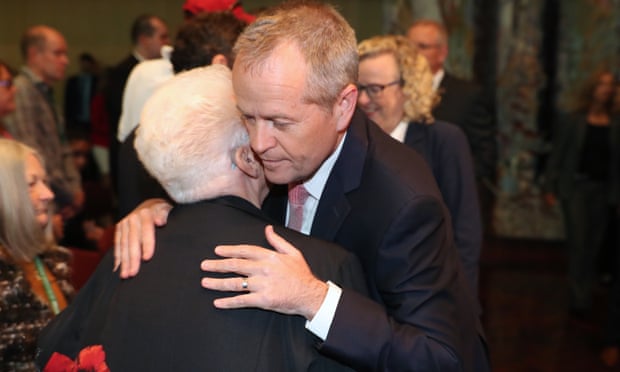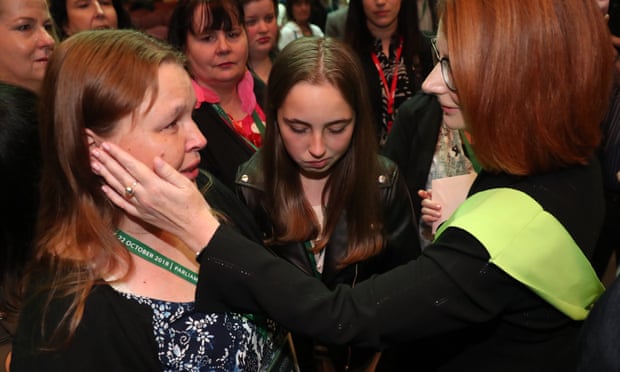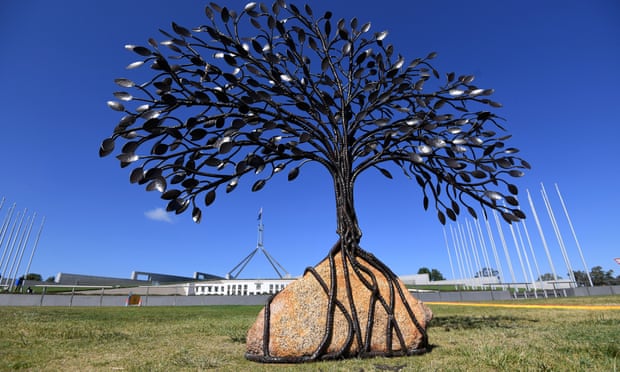'Why was their trust betrayed?': Australia apologises to child sexual abuse victims
Guardian Australia
Melissa Davey
22 October 218
 Australian Prime Minister Scott Morrison, centre left, and the opposition leader Bill Shorten, centre right, meet with members of the public after Morrison delivered the national apology. Photograph: Sean Davey/AFP/Getty Images
Australian Prime Minister Scott Morrison, centre left, and the opposition leader Bill Shorten, centre right, meet with members of the public after Morrison delivered the national apology. Photograph: Sean Davey/AFP/Getty Images
National apology after royal commission found institutions often failed to protect children
The Australian government has formally apologised to victims of child sexual abuse, after a five-year inquiry found governments, schools, sporting clubs, churches, charities and other institutions for decades failed to keep children safe.
“We believe you,” the prime minister, Scott Morrison, told victims, survivors and their families before parliament on Monday.
“Today, we confront a question too horrible to ask, let alone answer – why weren’t the children of our nation loved, nurtured and protected? Why was their trust betrayed?”
Morrison spoke in the House of Representatives, which was packed with victims, survivors, advocates and their families. More than 800 came to watch from parliament’s Great Hall.
The Australian government has formally apologised to victims of child sexual abuse, after a five-year inquiry found governments, schools, sporting clubs, churches, charities and other institutions for decades failed to keep children safe.
“We believe you,” the prime minister, Scott Morrison, told victims, survivors and their families before parliament on Monday.
“Today, we confront a question too horrible to ask, let alone answer – why weren’t the children of our nation loved, nurtured and protected? Why was their trust betrayed?”
Morrison spoke in the House of Representatives, which was packed with victims, survivors, advocates and their families. More than 800 came to watch from parliament’s Great Hall.
 The opposition leader, Bill Shorten, hugs a member of the public following the national apology. Photograph: Mike Bowers for the Guardian
The opposition leader, Bill Shorten, hugs a member of the public following the national apology. Photograph: Mike Bowers for the Guardian
“While we can’t be so vain to pretend to answers, we must be so humble to fall before those who were forsaken and beg to them our apology,” he said. “A sorry from a nation that seeks to reach out in compassion into the darkness, where you have lived for so long. Nothing we can do now will right the wrongs inflicted on our nation’s children.”
Politicians past and present cried as the apology was read. Some attendees wore badges with names of loved ones who had been abused but who had died or who could not attend written on them. In a rare move, question time, which had been scheduled for the afternoon, was delayed a day at the request of survivors.
Australia’s institutional child sexual abuse commission made 409 recommendations when it delivered its findings in December. Of those, 122 directly or partly involved the federal government. While the government has involved the states and territories in establishing a redress scheme, and sweeping reforms for the Catholic Church and other religious institutions have begun, the apology was a formal acknowledgement that abuse was covered up and that children were ignored.
It was live-streamed around the country. In Victoria, four viewing sites were set up for those who could not afford to travel to parliament house in Canberra or who were too old or sick. It was also telecast at the Sydney Opera House in New South Wales. And the personal stories of victims shared by Morrison and opposition leader Bill Shorten were broadcast throughout the country.
“The crimes of ritual sexual abuse happened in schools, churches, youth groups, scout troops, orphanages, foster homes, sporting clubs, group homes, charities, and in family homes as well,” Morrison said.
“It happened anywhere a predator thought they could get away with it, and the systems within these organisations allowed it to happen and turned a blind eye. It happened day after day, week after week, month after month, decade after decade, unrelenting torment.
“When a child spoke up, they weren’t believed and the crimes continued with impunity. One survivor told me that when he told a teacher of his abuse, that teacher then became his next abuser – trust broken, innocence betrayed, power and position exploited for evil, dark crimes.”
Politicians past and present cried as the apology was read. Some attendees wore badges with names of loved ones who had been abused but who had died or who could not attend written on them. In a rare move, question time, which had been scheduled for the afternoon, was delayed a day at the request of survivors.
Australia’s institutional child sexual abuse commission made 409 recommendations when it delivered its findings in December. Of those, 122 directly or partly involved the federal government. While the government has involved the states and territories in establishing a redress scheme, and sweeping reforms for the Catholic Church and other religious institutions have begun, the apology was a formal acknowledgement that abuse was covered up and that children were ignored.
It was live-streamed around the country. In Victoria, four viewing sites were set up for those who could not afford to travel to parliament house in Canberra or who were too old or sick. It was also telecast at the Sydney Opera House in New South Wales. And the personal stories of victims shared by Morrison and opposition leader Bill Shorten were broadcast throughout the country.
“The crimes of ritual sexual abuse happened in schools, churches, youth groups, scout troops, orphanages, foster homes, sporting clubs, group homes, charities, and in family homes as well,” Morrison said.
“It happened anywhere a predator thought they could get away with it, and the systems within these organisations allowed it to happen and turned a blind eye. It happened day after day, week after week, month after month, decade after decade, unrelenting torment.
“When a child spoke up, they weren’t believed and the crimes continued with impunity. One survivor told me that when he told a teacher of his abuse, that teacher then became his next abuser – trust broken, innocence betrayed, power and position exploited for evil, dark crimes.”
 Former prime minister Julia Gillard, right, meets Claudia and her mum Karen in the great hall where the national apology was read. Photograph: Mike Bowers for the Guardian
Former prime minister Julia Gillard, right, meets Claudia and her mum Karen in the great hall where the national apology was read. Photograph: Mike Bowers for the Guardian
Shorten’s speech reflected the anger still felt by many survivors and families. Children continue to be abused, he said. The true test for parliament would be “what happens next”, he added.
“We are sorry that the abuse and the assault and the rape of children is still going on and being covered up,” Shorten said. “And we are sorry all of us in this parliament that we’ve not yet done enough to guarantee that this cannot happen again. Too many Australian children are still living unsafe lives at risk.”
Applause erupted when former prime minister Julia Gillard was mentioned. It was Gillard who established the royal commission into institutional child sexual abuse in 2013, without which hundreds of crimes would not have been exposed and reforms delayed or ignored. She was invited to the stage in the Great Hall, and said: “I am sitting where I wanted be, with the survivors and their families and friends and thank you to the very great honour you have paid to me today by acknowledging me in the room. It means a great deal to me.”
“We are sorry that the abuse and the assault and the rape of children is still going on and being covered up,” Shorten said. “And we are sorry all of us in this parliament that we’ve not yet done enough to guarantee that this cannot happen again. Too many Australian children are still living unsafe lives at risk.”
Applause erupted when former prime minister Julia Gillard was mentioned. It was Gillard who established the royal commission into institutional child sexual abuse in 2013, without which hundreds of crimes would not have been exposed and reforms delayed or ignored. She was invited to the stage in the Great Hall, and said: “I am sitting where I wanted be, with the survivors and their families and friends and thank you to the very great honour you have paid to me today by acknowledging me in the room. It means a great deal to me.”
 A memorial tree sculpture was placed in front of parliament house for the national apology. Photograph: Lukas Coch/AAP
A memorial tree sculpture was placed in front of parliament house for the national apology. Photograph: Lukas Coch/AAP
While many cried tears of relief and praised the apology, there was also a mood of anger and frustration. As the apology was formally tabled, spectators yelled out: “Why do the institutions still get public money?” and “Stop funding them”. Others heckled the government to stop detaining children on Nauru, and to acknowledge children of the military.
But for others, the apology contributed in part to ongoing healing.
Advocate, author and abuse survivor Manny Waks, who now lives in Israel, travelled to Canberra to represent those abused within the Australian Jewish community.
“This has been a very difficult journey for many of us – hopefully, this landmark government apology will have its desired effect: to assist in the ongoing healing process of the many who have been impacted by the scourge of child sexual abuse within institutions,” he said.
Originally published at Guardian Australia.
But for others, the apology contributed in part to ongoing healing.
Advocate, author and abuse survivor Manny Waks, who now lives in Israel, travelled to Canberra to represent those abused within the Australian Jewish community.
“This has been a very difficult journey for many of us – hopefully, this landmark government apology will have its desired effect: to assist in the ongoing healing process of the many who have been impacted by the scourge of child sexual abuse within institutions,” he said.
Originally published at Guardian Australia.